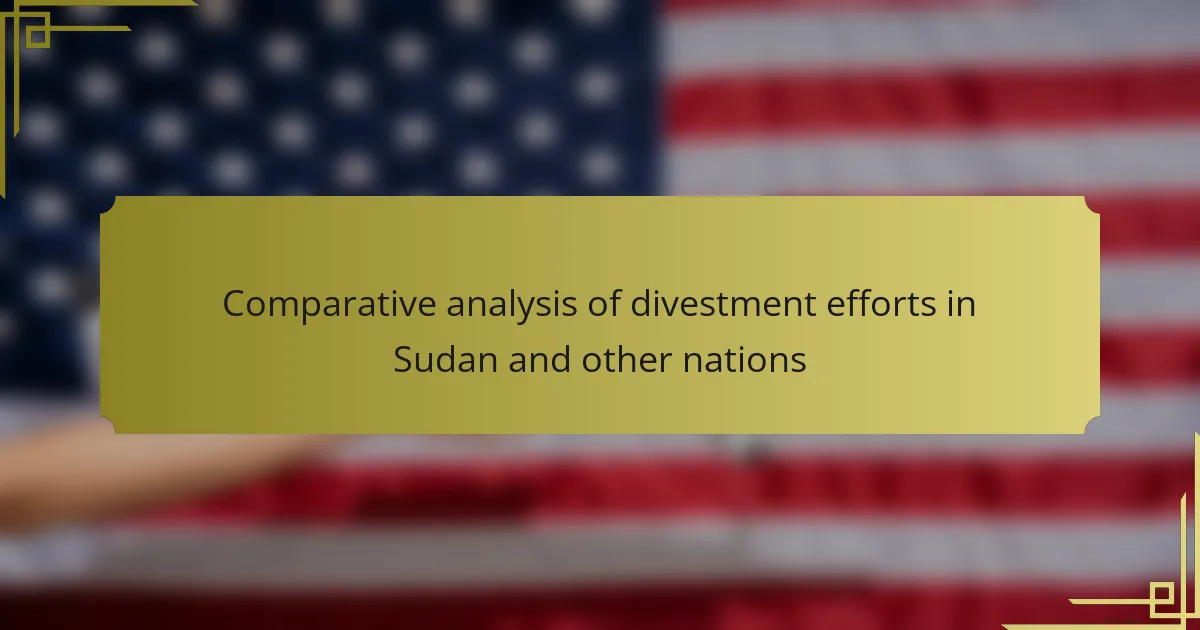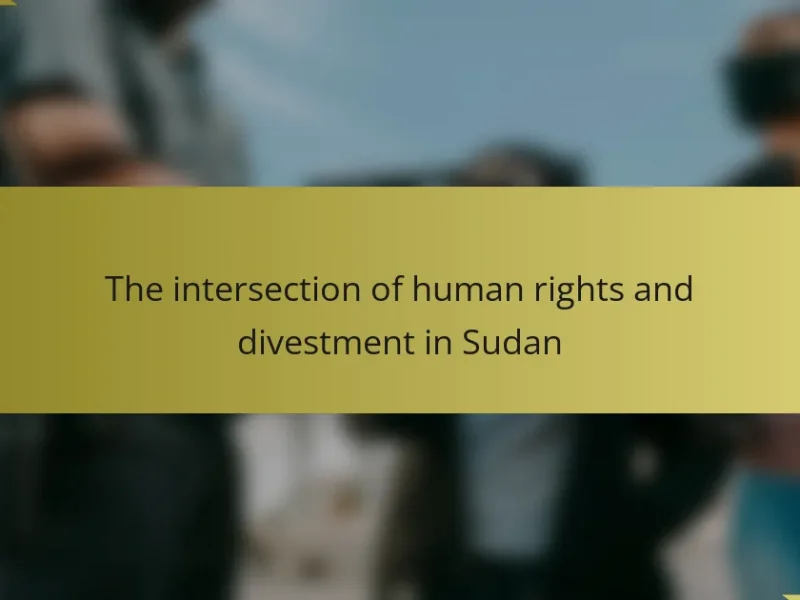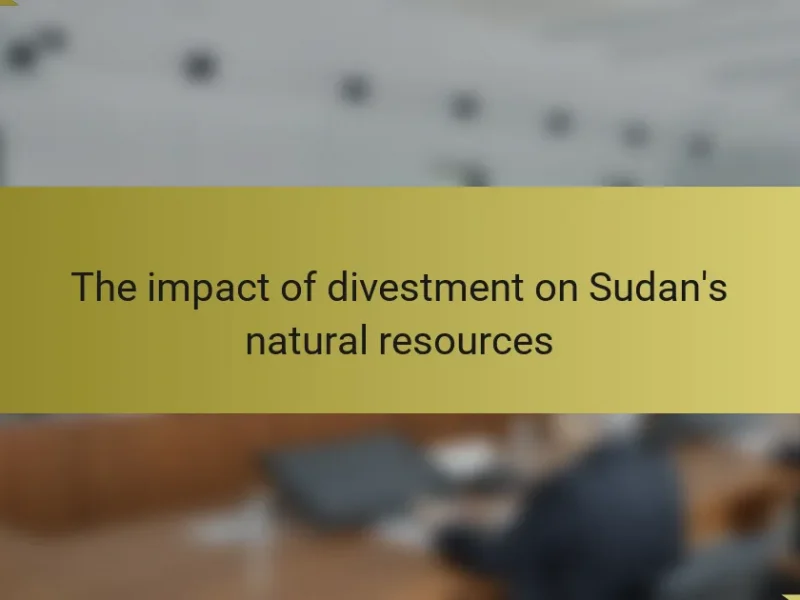The article examines divestment efforts in Sudan, focusing on the withdrawal of investments from companies linked to human rights abuses amid ongoing conflict and humanitarian crises. It highlights the role of the Sudan Divestment Task Force and compares these efforts to similar initiatives in other countries, such as Norway and New Zealand, which target fossil fuels to promote environmental sustainability. The historical context of divestment in Sudan is rooted in its civil conflicts, particularly the Second Sudanese Civil War and the Darfur conflict, which led to increased advocacy for economic sanctions. The article also discusses the limited economic impact of divestment in Sudan compared to more effective cases like South Africa during apartheid, emphasizing the need for cohesive international support to enhance the effectiveness of such strategies.
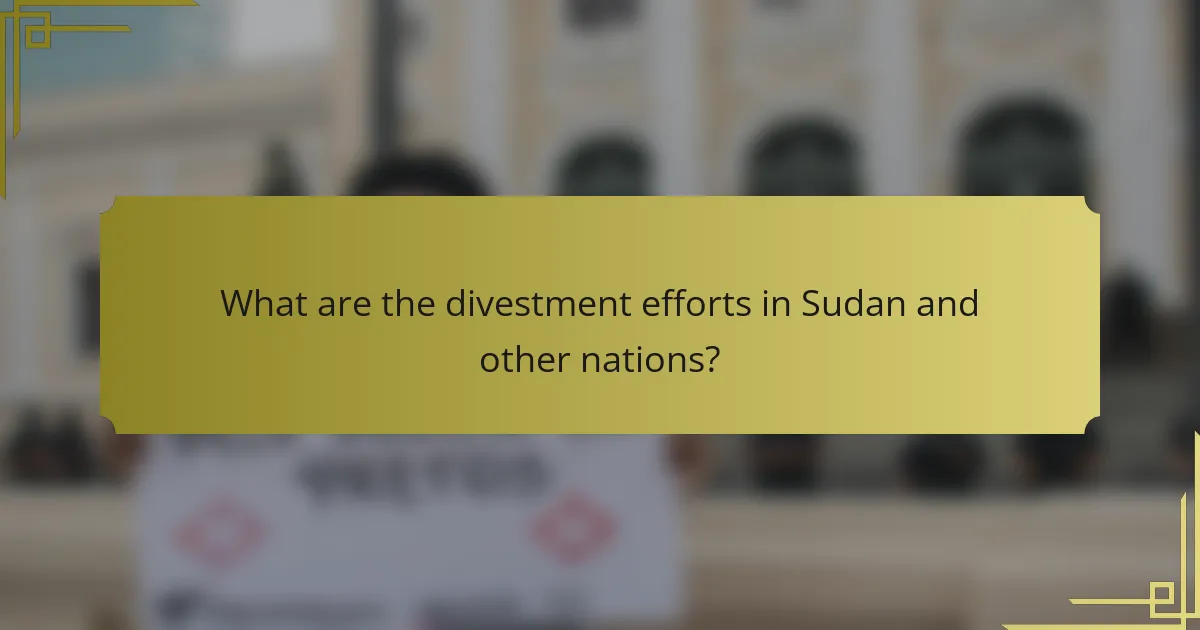
What are the divestment efforts in Sudan and other nations?
Divestment efforts in Sudan focus on withdrawing investments from companies operating in sectors linked to human rights abuses. Various organizations and governments have called for divestment due to the ongoing conflict and humanitarian crisis. Notably, the Sudan Divestment Task Force was established to promote investments in ethical companies.
In other nations, divestment efforts often target fossil fuels and industries contributing to climate change. Countries like Norway and New Zealand have implemented policies to divest from coal and oil companies. These efforts aim to align investment portfolios with environmental sustainability goals.
Both Sudan and other nations showcase a growing trend toward responsible investing. The movement emphasizes ethical considerations alongside financial returns. This shift reflects a broader awareness of social and environmental issues in investment strategies.
How do divestment efforts differ across various countries?
Divestment efforts differ across various countries based on political, economic, and social contexts. In the United States, divestment movements often focus on fossil fuels and social justice issues. Activists leverage state and local government policies to encourage divestment from companies linked to environmental harm. In contrast, European countries like Norway and Denmark have strong state-led initiatives that mandate divestment from fossil fuel investments in public funds.
Countries in the Global South, such as Sudan, face unique challenges. Economic instability and reliance on foreign investment complicate divestment efforts. Sudan’s divestment landscape is influenced by international sanctions and local governance issues. These differences highlight how national priorities and regulatory environments shape divestment strategies. Each country’s approach reflects its specific circumstances and societal values.
What factors influence divestment strategies in Sudan?
Divestment strategies in Sudan are influenced by political instability, economic conditions, and international sanctions. Political instability includes ongoing conflicts and governance issues that create uncertainty for investors. Economic conditions encompass factors like inflation, currency devaluation, and limited access to financial markets. International sanctions imposed by various countries restrict trade and investment opportunities. Additionally, human rights concerns and ethical considerations also drive divestment decisions. For instance, companies may withdraw due to pressure from advocacy groups highlighting human rights abuses in Sudan.
What unique challenges do other nations face in their divestment efforts?
Other nations face unique challenges in their divestment efforts due to economic dependency on fossil fuels. Many countries rely heavily on revenues from oil and gas, making divestment politically sensitive. Additionally, the lack of alternative energy sources complicates the transition. Regulatory frameworks may not support swift divestment, creating legal hurdles. There is also the challenge of public opinion, as citizens may resist changes that impact jobs. Moreover, international market pressures can deter nations from pursuing aggressive divestment strategies. Countries with less financial stability face greater risks in shifting investments. These factors collectively hinder effective divestment initiatives in various nations.
Why is divestment a significant strategy for social change?
Divestment is a significant strategy for social change because it targets financial support for unethical practices. By withdrawing investments, organizations and individuals signal disapproval of harmful activities. This action can pressure companies to alter their behavior. Historical examples include the anti-apartheid movement in South Africa. Divestment campaigns effectively mobilized public opinion against the apartheid regime. Studies show that divestment can lead to decreased financial resources for targeted entities. In turn, this can spur policy changes and promote social justice. Thus, divestment serves as a powerful tool for advocating ethical practices and fostering societal transformation.
How does divestment impact local economies and communities?
Divestment negatively impacts local economies and communities by reducing investment and job opportunities. When companies withdraw investments, local businesses suffer from decreased economic activity. This often leads to higher unemployment rates and lower wages for residents.
In regions heavily reliant on specific industries, divestment can create economic instability. For example, in Sudan, divestment from oil companies led to a decline in government revenue. This loss of revenue can hinder public services, such as education and healthcare.
Studies show that divestment can also lead to social unrest. Communities may experience increased tensions as job losses mount. The overall effect is a weakened local economy and diminished community resilience.
What role does public opinion play in shaping divestment policies?
Public opinion significantly influences divestment policies. It serves as a catalyst for change by reflecting societal values and priorities. When a large segment of the public expresses concern about ethical issues, policymakers often respond. For instance, widespread opposition to apartheid in South Africa led to significant divestment actions. Similarly, in recent years, increased awareness of climate change has prompted calls for divestment from fossil fuels. Research indicates that campaigns driven by public sentiment can lead to tangible policy shifts. Organizations and investors often align their strategies with public expectations to maintain legitimacy. Therefore, public opinion acts as both a motivator and a measure of accountability in shaping divestment policies.

What historical context surrounds divestment efforts in Sudan?
Divestment efforts in Sudan have historical roots tied to the country’s prolonged civil conflict and human rights abuses. The Second Sudanese Civil War, which lasted from 1983 to 2005, led to widespread violence and displacement. In response, various organizations began advocating for divestment from companies operating in Sudan. The Darfur conflict, which escalated in the early 2000s, intensified these efforts. Activists highlighted the Sudanese government’s role in atrocities, prompting calls for economic sanctions. By 2006, numerous states and institutions had implemented divestment strategies. These actions aimed to pressure the Sudanese government to cease human rights violations. The historical context of divestment in Sudan is thus intertwined with its civil unrest and international advocacy for human rights.
How have past conflicts influenced current divestment strategies?
Past conflicts have significantly shaped current divestment strategies by highlighting the risks associated with investing in unstable regions. Historical instances, such as the divestment movements during apartheid in South Africa, demonstrated that economic pressure could influence political change. Similarly, conflicts in Sudan prompted international businesses and investors to reconsider their involvement due to human rights violations and instability. The Sudanese Civil War and ongoing violence led to widespread calls for divestment from companies supporting the regime. This has resulted in a framework where investors now assess the moral and ethical implications of their investments. Additionally, past conflicts have encouraged the development of guidelines for responsible investment, influencing current strategies that prioritize ethical considerations alongside financial returns. The lessons learned from these historical contexts continue to inform how investors and organizations approach divestment today.
What lessons can be learned from previous divestment movements?
Previous divestment movements illustrate key lessons for future efforts. First, clear communication of goals is essential. Movements that articulated specific objectives, like the anti-apartheid divestment, were more effective. Second, grassroots mobilization plays a crucial role. Engaging communities and stakeholders fosters broader support. Third, timing and context matter significantly. Successful movements often coincided with political opportunities, as seen in the divestment from Sudan. Fourth, coalition-building enhances impact. Collaborative efforts among diverse groups amplify influence. Lastly, sustained pressure is necessary for change. Continuous advocacy maintains momentum and visibility.
How does Sudan’s political landscape affect its divestment initiatives?
Sudan’s political landscape significantly impacts its divestment initiatives. The ongoing instability and conflict hinder foreign investment. Political uncertainty creates a risk-averse environment for investors. Additionally, sanctions imposed by international bodies limit access to global markets. These factors collectively discourage divestment efforts. Historical context reveals that past regimes have faced international isolation due to human rights violations. This isolation has further stunted economic growth and divestment opportunities. The lack of a stable governance structure complicates regulatory frameworks for potential investors. As a result, Sudan’s divestment initiatives struggle to gain traction in a challenging political climate.
What international frameworks support divestment efforts?
International frameworks that support divestment efforts include the United Nations Principles for Responsible Investment (UNPRI) and the Global Reporting Initiative (GRI). The UNPRI encourages investors to incorporate environmental, social, and governance (ESG) factors into their investment decisions. This framework has over 4,000 signatories, representing over $100 trillion in assets under management. The GRI provides a standardized framework for sustainability reporting, helping organizations disclose their impacts on the economy, environment, and society. Both frameworks promote transparency and accountability, which are crucial for effective divestment strategies. Additionally, the Paris Agreement influences divestment by setting international climate goals, prompting investors to withdraw from fossil fuel investments.
How do global organizations influence divestment in Sudan and beyond?
Global organizations influence divestment in Sudan and beyond through advocacy, policy formulation, and economic pressure. They mobilize public opinion against investments in regions with human rights violations. For example, the Sudan Divestment Task Force has successfully pushed universities and pension funds to withdraw investments. This has led to significant financial losses for companies operating in Sudan. Additionally, organizations like Amnesty International provide reports that highlight human rights abuses. These reports often spur governments to enact sanctions that further deter investment. The cumulative effect of these actions creates a challenging environment for businesses in Sudan. Overall, global organizations play a crucial role in shaping the landscape of divestment through coordinated efforts and strategic campaigns.
What are the key policies that facilitate or hinder divestment?
Key policies that facilitate divestment include regulatory frameworks promoting ethical investment practices and transparency requirements. These frameworks encourage investors to withdraw from sectors linked to human rights abuses. For instance, laws mandating divestment from companies operating in conflict zones can drive significant capital away from harmful industries.
Conversely, policies that hinder divestment often include tax incentives for investments in certain sectors and lack of enforcement of existing ethical guidelines. Such incentives can make it financially beneficial for investors to remain involved in controversial industries. Additionally, weak regulatory oversight can allow companies to operate without accountability, thus obstructing divestment efforts.
The effectiveness of these policies can be observed in various nations. For example, legislation in the United States has successfully facilitated divestment from companies in Sudan due to human rights concerns. However, in countries with lax regulations, divestment efforts face considerable challenges.
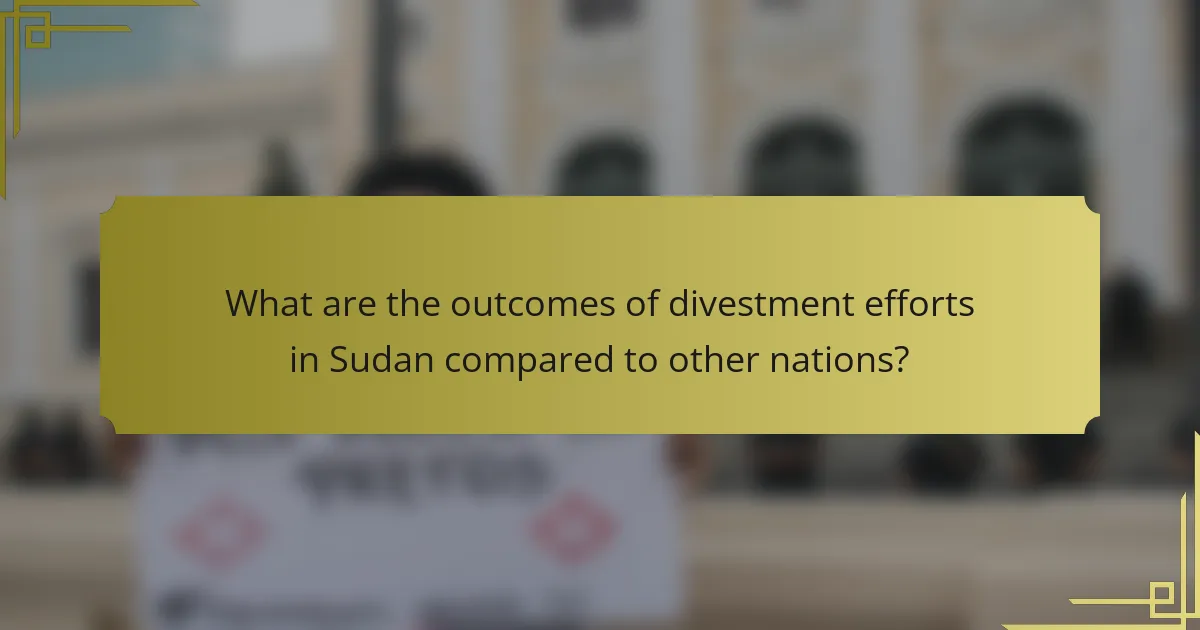
What are the outcomes of divestment efforts in Sudan compared to other nations?
Divestment efforts in Sudan have resulted in limited economic impact compared to other nations. Many multinational companies withdrew investments due to concerns over human rights and conflict. However, these divestment actions did not significantly alter the Sudanese government’s policies or practices. In contrast, divestment in countries like South Africa during apartheid led to substantial political and social change. Research indicates that divestment can pressure governments when combined with international sanctions. In Sudan, the lack of cohesive international support diminished the effectiveness of divestment. Thus, while divestment occurred, its outcomes were less impactful compared to other historical instances.
How effective have divestment campaigns been in achieving their goals?
Divestment campaigns have been moderately effective in achieving their goals. In many cases, they have successfully raised awareness about issues like climate change and human rights abuses. For instance, the fossil fuel divestment movement has led to over $14 trillion in assets being divested globally. This has pressured companies to reconsider their practices and policies. Additionally, some institutions have committed to transitioning to sustainable investments as a result. However, the actual impact on the targeted industries remains debated. Critics argue that divestment alone does not directly lead to significant changes in corporate behavior. Overall, while divestment campaigns have made strides in awareness and institutional change, their direct effectiveness in altering business practices is still under scrutiny.
What metrics are used to measure the success of divestment efforts?
Metrics used to measure the success of divestment efforts include financial performance, social impact, and stakeholder engagement. Financial performance assesses changes in investment value post-divestment. Social impact evaluates improvements in social conditions or environmental factors linked to divested sectors. Stakeholder engagement measures the involvement and response of affected communities and organizations. These metrics provide a comprehensive view of divestment effectiveness. Research indicates that successful divestment can lead to a 10% increase in social welfare in impacted regions, highlighting the importance of these metrics.
How do the results of divestment in Sudan compare with those in other nations?
Divestment in Sudan has led to significant economic and political changes, similar to results observed in other nations. In Sudan, divestment has resulted in increased international pressure on the government. This has prompted some reforms, although the overall impact on human rights has been limited. In contrast, countries like South Africa experienced substantial political transformation following divestment campaigns. The anti-apartheid movement showcased how divestment can lead to systemic change. Studies indicate that targeted divestment can disrupt funding for oppressive regimes. Thus, while divestment in Sudan has had some effects, they are less pronounced than in nations with more successful campaigns, such as South Africa.
What best practices can be adopted for successful divestment efforts?
Successful divestment efforts can be achieved through strategic planning, stakeholder engagement, and clear communication. Establishing a comprehensive divestment strategy is crucial. This strategy should outline specific goals and timelines. Engaging stakeholders, including investors and affected communities, fosters transparency and trust. Regular updates on progress and challenges enhance accountability. Utilizing data-driven analysis helps in making informed decisions. Monitoring and evaluating the impact of divestment efforts ensures continuous improvement. Collaborating with experts can provide valuable insights and support. These practices have been shown to enhance the effectiveness of divestment initiatives in various contexts.
How can stakeholders collaborate to enhance divestment strategies?
Stakeholders can collaborate to enhance divestment strategies by sharing resources and knowledge. This collaboration can facilitate better decision-making. For instance, investors can share data on the financial impacts of divestment. NGOs can provide insights into social and environmental consequences. Governments can offer regulatory support to streamline the divestment process. Collaborative platforms can be established for ongoing dialogue among stakeholders. Research indicates that collective action leads to more effective divestment outcomes. A study by the Global Investor Coalition found that coordinated efforts resulted in a 30% increase in divestment success rates. This evidence supports the notion that collaboration is crucial for impactful divestment strategies.
What key lessons can be applied from successful divestment cases?
Successful divestment cases reveal key lessons in strategic planning and stakeholder engagement. Effective communication is vital for garnering support from stakeholders. Transparency in objectives fosters trust and collaboration. Research indicates that targeted campaigns can mobilize public opinion, as seen in South Africa’s anti-apartheid movement. Building coalitions with like-minded organizations enhances impact and reach. Regular assessment of divestment strategies ensures adaptability to changing circumstances. Leveraging social media amplifies messages and engages wider audiences. Ultimately, successful divestment requires a clear vision and commitment to ethical principles.
The main entity of the article is “divestment efforts,” specifically focusing on Sudan and other nations. The article provides a comparative analysis of divestment initiatives, highlighting the motivations, challenges, and outcomes associated with these efforts in various political and economic contexts. It examines the influence of historical conflicts on current divestment strategies, the role of public opinion, and the effectiveness of international frameworks in shaping these initiatives. Additionally, the article discusses the impact of divestment on local economies and communities, offering insights into best practices and metrics for measuring success.
